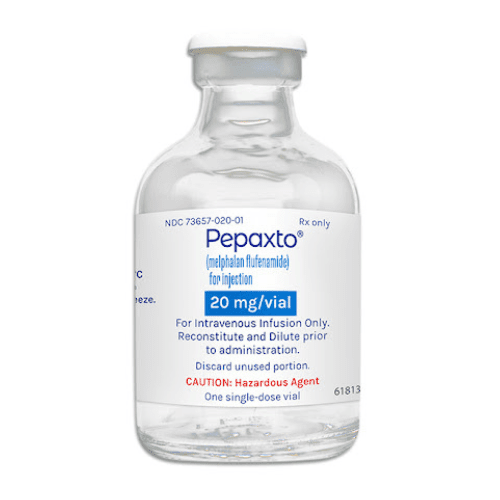Melphalan Flufenamide Dosage
Applies to the following strengths: 20 mg
Usual Adult Dose for:
Additional dosage information:
Usual Adult Dose for Multiple Myeloma
40 mg IV over 30-minute on Day 1 of each 28-day cycle
Comments:
- This drug is not recommended for use as a conditioning regimen for transplant outside controlled clinical trials.
- Continue treatment until disease progression or unacceptable toxicity.
- Administer dexamethasone 40 mg orally or IV on Days 1, 8, 15, and 22 of each cycle.
- Dexamethasone dose should be reduced to 20 mg in patients 75 years of age or older.
- Consider the use of antiemetic medicine such as a serotonin-3 receptor antagonist or other antiemetics prior to and during treatment.
Use:
- In combination with dexamethasone for the treatment of adult patients with relapsed or refractory multiple myeloma who have received at least four prior lines of therapy and whose disease is refractory to at least one proteasome inhibitor, one immunomodulatory agent, and one CD38-directed monoclonal antibody
Renal Dose Adjustments
Data not available
Liver Dose Adjustments
Data not available
Dose Adjustments
RECOMMENDED DOSE REDUCTION FOR ADVERSE REACTIONS:
- First Reduction: 30 mg IV on Day 1 of each 28-day cycle
- Second Reduction: 20 mg IV on Day 1 of each 28-day cycle
- Subsequent Reductions: Permanently discontinue treatment in patients unable to tolerate the dose of 20 mg IV on Day 1 of each 28-day cycle
RECOMMENDED ACTIONS FOR ADVERSE REACTIONS:
HEMATOLOGIC ADVERSE REACTIONS:
Myelosuppression:
If platelet count less than 50 x 10(9)/L on a schedule dosing day:
- Withhold and monitor platelet count weekly until platelet count 50 x 10(9)/L or greater
- Resume at the same dose if the delay is 2 weeks or less
- Resume at one dose level lower if the delay is more than 2 weeks
If absolute neutrophil count less than 1 x 10(9)/L on a schedule dosing day:
- Withhold and monitor neutrophil count weekly until neutrophil counts is 1 x 10(9)/L or greater
- Resume at same dose if the delay is 2 weeks or less
- Resume at one dose level lower if the delay is more than 2 weeks
If Grade 4 hematological adverse reaction on a schedule dosing day in two consecutive cycles:
- Resume at one dose level lower
NONHEMATOLOGIC ADVERSE REACTIONS:
If Grade 2:
- Consider withholding drug until resolved to at least Grade 1 of baseline
- Consider resuming this drug at one dose level lower
If Grade 3 or 4:
- Withhold drug until resolved to at least Grade 1 or baseline
- Resume drug at one dose level lower as clinically appropriate
Precautions
CONTRAINDICATIONS: History of serious hypersensitivity reaction to melphalan flufenamide, melphalan, or any of the ingredients.
Safety and efficacy have not been established in patients younger than 18 years.
Consult WARNINGS section for additional precautions.
Dialysis
Data not available
Other Comments
Administration Advice:
- Administer the diluted solution as an IV infusion over 30-minute.
- The infusion of the diluted product must begin within 60 minutes of start or reconstitution.
- This drug should be reconstituted and further diluted prior to IV infusion.
- Use aseptic technique.
- The vial stopper of this product is NOT made with natural rubber latex.
- Visually inspect the product prior to the infusion.
- Do not use the product if visible opaque particles, discoloration, or foreign particles are observed.
Storage Requirements:
- Store at 36F to 46F (2C to 8C)
- Keep drug in the original carton and protect from light.
- This drug degrades in solution, especially at room temperature.
- Do not exceed the storage timelines for the diluted solution.
- The diluted solution should be stored for up to 6 hours at 36F to 46F (2C to 8C) within 30 minutes of the initial reconstitution.
Reconstitution/preparation techniques:
- The manufacturer product information should be consulted.
Monitoring:
- Monitor platelets, red blood cells, and neutrophil counts before starting therapy and as clinically indicated during treatment, with increased frequency during the first two months of treatment.
- Monitor for signs and symptoms of infections.
- Monitor patients long-term after treatment for the development of secondary malignancies.
Patient Advice:
- Advise patients to read the approved patient labeling.
- Advise females of the potential risk to a fetus and inform their healthcare provider of a known or suspected pregnancy.
- Advise females of reproductive potential to use effective contraception during treatment and for at least 6 months after the last dose.
- Advise not to breastfeed during treatment and for at least 1 week after the last dose.
- Advise males with a female partner of reproductive potential to use effective contraception during treatment and for at least 3 months after the last dose.
- Advise patients on the risk of secondary malignancies.
- Advise patients to immediately report any signs and symptoms suggestive of thrombocytopenia, neutropenia, and anemia.
- Advise patients that complete blood counts will be obtained prior to therapy and as clinically indicated during treatment.
- Advise patients that this drug can cause infections and immediately report any new or worsening signs or symptoms of infection.
More about melphalan flufenamide
- Check interactions
- Compare alternatives
- Latest FDA alerts (1)
- Side effects
- During pregnancy
- Drug class: alkylating agents
Patient resources
Other brands
Professional resources
Other brands
Related treatment guides
See also:
Further information
Always consult your healthcare provider to ensure the information displayed on this page applies to your personal circumstances.


